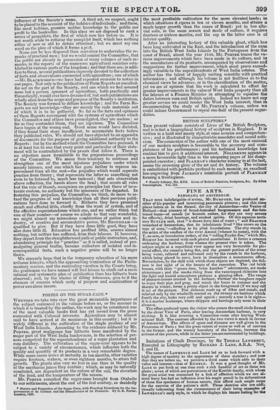PORTER ON THE SUGAR-CAE.
WHETHER we take into view the great mercantile importance of the subject embraced in the volume before us, or the manner in which it is treated by the author, the work may be considered one of the most valuable books that has yet issued from the press connected with Colonial interests. Agriculture may be almost said to have arrived at its maximum in this country; but it is widely different in the cultivation of the staple produce of our West India Islands. According to the evidence adduced by Mr. PORTER, great negligence has hitherto been manifested by the major part of the West India landowners, in the selection of per- sons competent for the superintendence of a sugar plantation and rum distillery. The cultivation of the sugar-cane appears to be subject to a variety of circumstances, which influence both the quality and quantity of its products in a very remarkable degree. While some canes arrive at maturity in ten months, other varieties require fourteen, sixteen, or even eighteen months, to attain full growth. The plants also vary no.less in size than in the quality of the saccharine juices they contain ; which, as may be naturally concluded, are dependent on the nature of the soil, the elevation of the land, and the temperature of the season.
Mr. PORTER considers the sugar-cane brought from Otaheite to our settlements, about the end of the last century, as decidedly
Nature and Properties of the Sugar. Cane, with Practical Directions for the Im- provement of its Culture and the Atanufacture of its Products. By G. R. Porter. London, 1830.
the most profitable cultivation for the more elevated lends- in which situations it ripens in ten or eleven months, and attains s much larger growth than the canes of Brazil: yet in low allu- vial soils, in the same season and mode of culture, it requires fourteen or sixteen months, and the sap in the latter case as of inferior quality. After an interesting history of this valuable plant, which has been long cultivated in the East, and the introduction of the cans into the -British West India Islands by the Portuguese from the coast of Brazil, about the year 1640, Mr. PORTER traces the va- rious improvements which have been made in its culture, and in the manufacture of its products, accompanied by observations anti suggestions for farther improvement, which must prove exceed- ingly valuable to the superintendents of West India estates. The author has the talent of happily uniting scientific with practice./ information ; and although his volume is not faultless as to the chemical views he advances, or in the classification of the matter, yet we are of opinion that his work is calculated to effect far greater improvements in the value of West India property than all the labours of a Finance Minister in attempting to equalize the duties between rum and British spirits. Indeed we know not any greater service we could render the West India interest, than in recommending, the study of Mr. PORTER'S volume, unless we could induce Government to repeal one-half of the present sugar- duties.


























 Previous page
Previous page